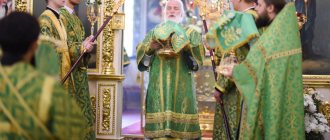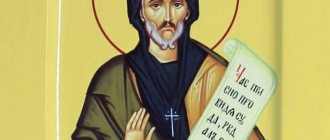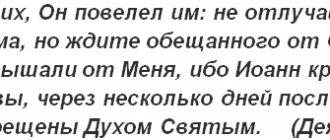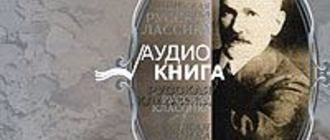May my prayer be corrected as the incense before You,
the lifting of my hand, the evening sacrifice.Lord, I called to You, hear me:
Hear the voice of my prayer, and always cry out to You.
Set, O Lord, a guard over my mouth, and a guard over my mouth.
Do not turn my heart into words of wickedness, and do not bear the guilt of sins.
Translation
May my prayer be corrected like a censer before You,
The raising of my hands is like the evening sacrifice.
Lord, I called to You, hear me!
Hear the voice of my prayer when I cry to You.
Guard, O Lord, my lips and guard the doors of my mouth.
Do not let my heart deviate towards evil words that justify oneself from sins.
Listen to the prayer performed by the choir:
At divine services, psalms are read frequently, occupying approximately 20% of the texts. These are the most ancient prayers or, in other words, Songs that were written over a thousand years. In monasteries they are taught by heart, read continuously, and some are recognized as one of the most powerful verses that help in various everyday situations.
Among them there are teaching, wisdom, prophetic, laudatory, God-glorifying, repentant and lamenting songs. Psalm of David 140 can be classified as one that admonishes and teaches how a righteous person should behave. The psalter is a musical instrument. We have not received information about what he looks like, but the poems are interpreted by many authors.
The meaning of the Song “May my prayer be corrected”
King David had many enemies, so this time there is no exact answer from whom he is fleeing: it is Saul, or his son Absalom, it is not known for sure. But the Holy Fathers recommend taking into account the repentance and humility with which he turns to God. John Chrysostom recommends reading the psalm every evening, for it teaches true humility:
- There is an analogy with the offering of the evening sacrifice, which requires fire, just as internal combustion is necessary to turn to God. Then the prayer will be corrected: it will not spread along the ground, but will ascend like incense from a censer.
- He prays to remain silent, so as not to utter speech that defiles a person. Even if they are directed against enemies. The tongue, although hidden in a “dungeon”, behind the teeth and lips, always overcomes these “constipation”. It is impossible to hold him. Therefore, David asks (and we learn from him) to put them in storage.
- Man is a crafty creature. When committing a sin, he always finds an excuse for it. He sees a speck in someone else's eye, but does not notice a log in his own. Therefore, the king asks God not to allow himself to fall into sins, after which lies are woven in order to whitewash himself. But I am ready to accept judgment from the righteous.
- The prophet predicts the fate of the wicked, who, living in prosperity, are like a stone. If you throw it into water, not a trace will remain.
- It is better to endure disasters and misfortunes that plunge the soul to hell, and accept punishment from the righteous, than to associate with corrupters of various kinds.
- Turning to God, asking for forgiveness and help to avoid destructive snares, David concludes: unlike the wicked, the righteous will be saved and pass on to eternal life.
Pyotr Ilyich Tchaikovsky "Morning Prayer"
Music for children.
In the history of world musical culture, this wonderful chapter deserves special attention. Its pages are decorated with the names of many brilliant musicians, including I.S. Bakh, V.A. Mozart, J. Haydn, R. Schumann and, undoubtedly, P.I. Tchaikovsky .
His piano cycle “Children's Album”, which has high artistic merit, is currently enjoying enormous popularity in different parts of the world, as it helps young musicians develop their performing skills with passion. A priceless masterpiece, which presents colorful images from the wonderful world of childhood like a kaleidoscope, includes twenty-four miniature plays, and it opens with the incredibly beautiful composition “Morning Prayer.” the history of the creation of the piano miniature “ Morning Prayer ” by Pyotr Ilyich Tchaikovsky, as well as interesting facts and the content of the work on our page.
Short story
There is no doubt that the history of the composition of the composition “Morning Prayer” is inextricably linked with the creation of the “ Children’s Album ”, written by Tchaikovsky in the spring months of 1878. During that period of his life, the composer’s creative tone was at its best: he completed his Fourth Symphony and worked with full dedication on the opera “Eugene Onegin ”.
However, it is worth noting that it was composing music that distracted him from the painful thoughts that haunted Pyotr Ilyich due to the problems that arose in his personal life at that time. In the spring of 1877, Tchaikovsky, in an unconscious impulse, hastily married Antonina Milyukova, but after a while he greatly regretted it. The disappointment was so great that he risked falling into a state of deep depression. To overcome his mental crisis, Tchaikovsky decides to go abroad. First he went to Switzerland, and then proceeded through France to Italy, where the composer was joined by his younger brother Modest with his ward, ten-year-old Kolya Conradi, who suffered from deaf-muteness.
The boy was so sweet and smart that Pyotr Ilyich took great pleasure in communicating and studying with him. Caring for this child, as well as walks with him, had a beneficial effect on the composer’s mood and, as a result, Tchaikovsky’s gloomy thoughts about doom gradually began to dissipate. However, at that time Kolya was not the only teenager who aroused his affection. Walking through the streets of Italian cities, Pyotr Ilyich often admired the little musicians who earned their living by performing folk songs.
Their singing may not have been very skillful, but it was so touching that it forced the brilliant maestro to truly admire. For example, the young Florentine Vittorio won the composer’s heart so much with his singing that Tchaikovsky even wrote to his friends about it. Such contact with the world of childhood made Pyotr Ilyich think about the need to make his own contribution to the development of the talents of the younger generation, since he was well aware that children's musical literature is very sparse. Tchaikovsky shared his plans in a letter in February 1878 with the owner of the music publishing house Pyotr Ivanovich Jurgenson. The composer informed the publisher that he intended to compose light pieces for children, like those that Robert Schumann presented in his piano cycle Album for Youth . Having received Jurgenson's approval, Tchaikovsky began to implement this intention soon after returning to Russia, that is, in April 1878.
After his voyage abroad, Tchaikovsky most of all wanted to meet his loved ones, and so he immediately went to Kamenka, where the composer’s younger sister Alexandra Ilyinichna Davydova lived. This estate was very dear to the composer, and not at all because the mesmerizing nature inspired him to create brilliant masterpieces. Pyotr Ilyich rested his soul here, and this was facilitated by the atmosphere of a family idyll that filled the house of his close relatives. However, the children, who by that time were already seven, brought the greatest joy and happiness into the life of the Davydov family. Tchaikovsky loved his nephews very much. He could play and walk with them for hours, talk about the countries he visited, organize dance parties and set off fireworks. So during this visit, the composer enjoyed communicating with his adored young relatives, but at the same time he also carefully observed their musical activities. As a result, the composer’s plan was realized and from his pen, at the end of May, sketches of twenty-four charming piano miniatures came out, reflecting the bright and pure world of childhood. Each piece, as originally conceived by Pyotr Ilyich, had a title that would be attractive to young musicians, and the collection opened with the above-mentioned composition “Morning Prayer.” The cycle was published at the end of 1878 by the Jurgenson publishing house with the title “Children's Album. A collection of light plays for children. Imitation of Schumann,” and is dedicated to the composer’s nephew Vladimir Davydov.
Interesting Facts
- Since religion was banned in the Soviet Union, in all editions of the “ Children’s Album ” the composition “Morning Prayer” was published under the title “Morning Reflection”.
- Pyotr Ilyich Tchaikovsky became the first composer in Russia to create a piano cycle specifically for children.
- Tchaikovsky never taught children and never even came into contact with this, however, all the pieces included in the “Children's Album” are written in such a way that their piano presentation is accessible to the physical capabilities of a small child’s hand.
- Tchaikovsky dedicated the piano cycle “Children's Album” to Vladimir Davydov, but this is not the only work that was so noted by the outstanding composer. Pyotr Ilyich also dedicated the famous Sixth Symphony , and in addition bequeathed to him most of the copyrights to his works, that is, he made Vladimir Lvovich his main heir.
- Pyotr Ilyich Tchaikovsky composed “Children’s Album” specifically for children, however, nowadays it is quite often performed by professional musicians. In addition, many compositions from the collection have been arranged for other instruments and even orchestras of various compositions.
Contents of the play “Morning Prayer”
"Morning Prayer" In the time of Pyotr Ilyich Tchaikovsky, every believer, whether an adult or a child, woke up and went to bed with an appeal to the Lord. In his morning prayer, he expressed gratitude to God for the coming day and asked him to direct him to accomplish good deeds. In the evening, there was gratitude to the Almighty for the past day, as well as a prayer for forgiveness for the unseemly deeds committed. Since the composer in his “Children’s Album” intended to use musical sounds to sublimely recreate various episodes from the life of a child, he considered that it would be correct if the cycle opened with the composition “Morning Prayer,” since at that time this was how the little man’s day began.
In this contemplative leisurely miniature, stylized as prayer and imbued with the purity of a child’s soul, the composer depicted a peaceful conversation between a child and God. Childlike spontaneity and humility are heard here in every intonation, and the peace of mind, serenity, but at the same time the concentration of the child is emphasized by simple harmony and uniform rhythmic movement.
The composition, written in the key of G major, time signature ¾, with the author's Andante tempo instructions, is concluded by the author in the form of a period, repeated structure, with an extended addition. Filled with peace and sublime contemplation, the musical material of the play is presented in a four-voice texture with elements of polyphony and resembles a church chorale or a solemn saraband.
The opening sentence of the miniature is divided into two four-bar phrases, the first of which consists of short motives ending with a long sound. This musical structure ends with an unstable dominant cadence.
Since the period in which the miniature is written is of a repeated structure, the beginning of the next second sentence repeats the first. Next, the dynamic development of the musical material begins, leading in the fourth bar of the section to a bright climax on the highest note. Then the sound fades, and the melodic line, which had previously been intensely rushing upward, begins to smoothly fall down, leading to the cadence on the tonic. Next comes the addition, which can also be considered a coda. In it, against the background of the dimensional sound of a tonic sound in the bass register and reminiscent of a bell, the melodic line, initially consisting of short motives, drops down from the second octave, and then rises up again with a gradually weakening sound. All this sounds like a farewell phrase, setting you up for inner peace and peace of mind.
The main difficulties that a young pianist faces when learning the piece “Morning Prayer”
- Continuous harmonization of the melodic line, which is formed by the chordal presentation of thematic material, requires careful work on voice leading. What is important here is the distinct sound production and melodiousness of each of the four voices.
- In this composition, which has a calm and thoughtful character, it is very important to choose the right tempo for performance so that the musical material does not seem static, that is, devoid of movement and development.
- Meaningful phrasing plays an important role in this work. A young pianist needs to learn how to combine small motifs, presented in a chord-harmonic texture, into a single sound line.
- Pedaling is of great importance when working on the musical material of a piece, as it helps to enrich and fill the sound. It is recommended to use a delay pedal for this song.
" Morning Prayer ". This beautiful piano composition, clearly reflecting the mental state of a little man, is a work of great importance in pedagogical practice, as it requires special attention and conscious comprehension from the young pianist. While working to create the image conceived by the composer, the young musician faces certain difficulties, overcoming which he improves his performing skills.
Did you like the page? Share with your friends:
Pyotr Ilyich Tchaikovsky "Morning Prayer"








